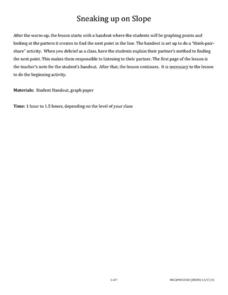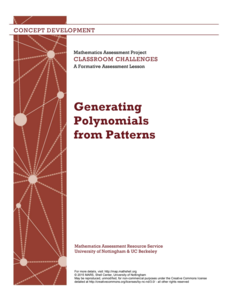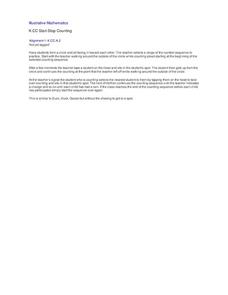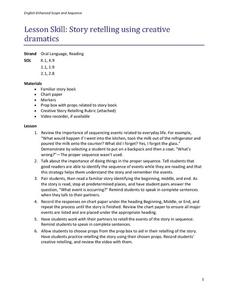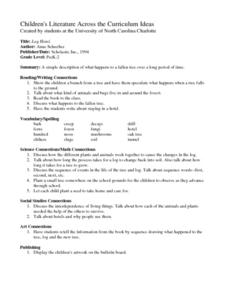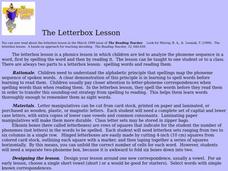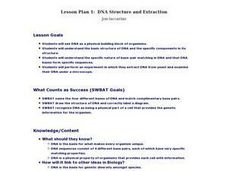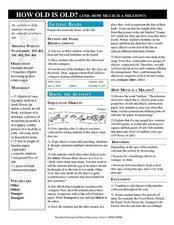Curated OER
Reading Poetry in the Middle Grades
Bring the beauty of "Nothing Gold Can Stay" by Robert Frost to middle school language arts. After learners read a copy of the poem, they follow an instructional sequence that focuses on sound, figurative language, and theme.
West Contra Costa Unified School District
Sneaking Up on Slope
Pupils determine the pattern in collinear points in order to determine the next point in a sequence. Using the definition of slope, they practice using the slope formula, and finish the activity with three different ways to...
National WWII Museum
Picturing the War in the Pacific: A Visual Time Line
The Pacific theater was critical to the Allied victory of World War II. Learners deconstruct the sequence of events around the conflict using stunning photographs. After they finish, pupils consider what additional dates and images they...
Mathematics Assessment Project
Generating Polynomials from Patterns
Patterns and polynomials go hand in hand. Budding mathematicians analyze sequences of dot diagrams to discover the patterns in the number of white dots and black dots. They use the identified patterns to write and simplify a polynomial...
Curated OER
Using Details from the Text
Explore non-fiction comprehension strategies with your class. They will visualize daily activities and label a 4 circle Venn diagram with related phrases. They must identify the overlapping sections as "main ideas," then complete a...
Curated OER
Start-Stop Counting
Similar to the game duck, duck, goose, assemble your class in a circle. Choose a number range (within ten numbers) begin walking around the circle counting and select a child by tapping her. The child then picks up the counting sequence...
Curated OER
Worksheet - Limits
In this limit worksheet, students give examples of described sequences and find the limits. They compute numbers in the Fibonacci sequence. This one-page worksheet contains six multi-step problems.
Curated OER
Story Retelling Using Creative Dramatics
Doing things in the proper sequence is the focus of a solid language arts lesson. In it, pupils discuss the importance of doing things in the right order. Then, they pair off and read a short story together. They must retell the story to...
Curated OER
Worksheet 37 - Practice Exam III - Integrals
For this integral worksheet, students use double integration to find area and volume. They identify the limits of a sequence. This one-page worksheet contains 11 problems.
Curated OER
How Mutations Lead to Changes in Cell Structure and Function
Students investigate how mutations lead to changes in cell structure and function. They construct an oligonucleotide, identify a protein sequence, design a step-by-step mechanism of how they think cells repair damaged DNA, and prepare...
Curated OER
Log Hotel
Students identify how the different plants and animals work together to cause the changes in the log. Students discuss the sequence of events in the life of the tree and log. Students plant a seed to take home and care for. Students...
Curated OER
Parts of the Plot: Constructing a Plot Diagram
Sixth graders conduct a plot diagram for a short story. They identify the problem, the rising action, the climax, the falling action, and the resolution. Students are able to sequence events in a story, and identify the parts of the plot...
Curated OER
Gift of the Magi
While reading O Henry's "The Gift of the Magi," your class will define and identify situational irony and allusion. Use a study guide (not included, but easy to produce) to record and discuss examples of allusion as you read. Map the...
Curated OER
The Letterbox Lesson
Students analyze phoneme sequence in a word. They spell words using phoneme analysis and read new words using phoneme analysis.
Curated OER
A Sentence for Life
What is a sentence? Second graders will explore the components of a sentence in the ten lessons of this unit. The subject, predicate, the process of proofreading, punctuation, and sentence sequence are analyzed in this unit. Handouts and...
Curated OER
Your Day as a Cycle
Fourth graders examine a variety of cycles. They take a look at life cycles of plants and animals, the cycle of the moon and tides, and other sequences of events in their daily lives. An interesting part of the lesson is how kids keep...
Curated OER
Writing Short Stories Using a Plot Diagram
Students read Abe Lincoln's Hat and use a plot diagram to identify the sequence of the story. They use plot diagrams to write their own stories from the perspective of Abraham Lincoln's hat.
Curated OER
DNA Structure and Extraction
Learners see DNA as a physical building block of organisms and comprehend the basic structure of DNA and the specific components in its structure. They can explain the specific nature of base-pair matching in DNA and that DNA bases form...
Curated OER
Bearstone: A Novel Analysis
Seventh graders need to be able to distinguish between major and minor characters and need to have read the novel Bearstone and be familiar with the sequence of events as well as the qualities displayed by each character over the course...
Curated OER
Soccer - Lesson 17 - Practice
Another lesson set up for teams to practice their skills and prepare for the World Cup tournament the class will have. There is a great warm-up for this lesson. It's called the Team Marathon, Activities and Sequence. It includes...
Curated OER
Elementary Economics:Making Smart Choices
Pupils understand what good and bad choices are in regards to money and review and reinforce the value of each coin. They identify parts of a story as well as the sequencing. They then create their own sequence of events in words and/or...
Curated OER
Making Cranberry Bread
While the preparation for this lesson plan is extensive, the results are well worth the effort. Prior to the lesson plan, Xerox the pictures from Cranberry Thanksgiving by Wende and Harry Devlin, collect the ingredients for Cranberry...
Curated OER
Froggy Fun
Students use downloadable pages to sort the stages of the frog life cycle into the correct, labelled sequence.
Desert Discoveries
How Old is Old? (And, How Much is a Million?)
Here is an interesting lesson on how old things are designed for young scientists. In it, learners compile a list of their birthdays, and the class puts them in sequential order from youngest to oldest. Then, they sequence 15 objects...
Other popular searches
- Sequencing Worksheets
- Sequencing Activities
- Story Sequencing
- Dna Sequencing
- Sequencing Events
- Sequencing Worksheets Germs
- Sequencing Stories
- Sequencing Vocabulary Words
- Story Sequencing Worksheets
- Planting Seeds Sequencing
- Free Sequencing Worksheets
- Sequencing a Story

